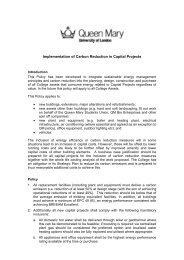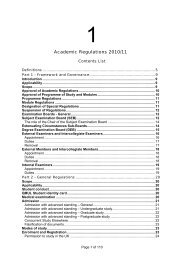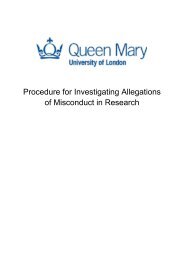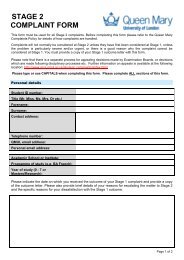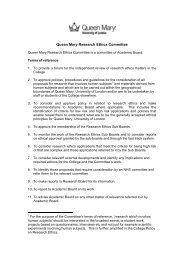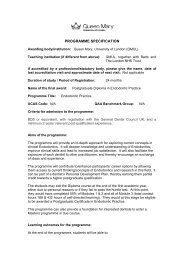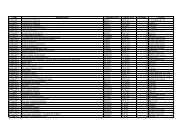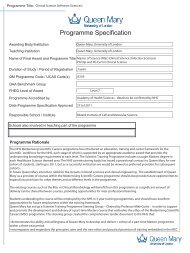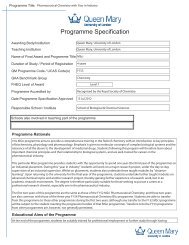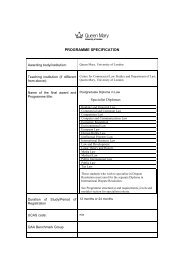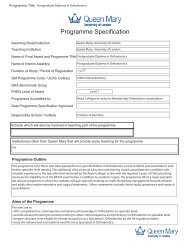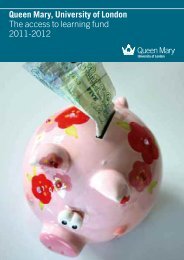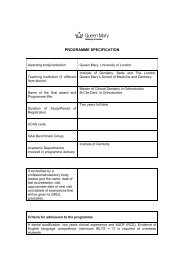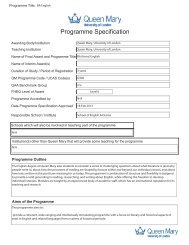Red pen version - Academic Registry and Council Secretariat ...
Red pen version - Academic Registry and Council Secretariat ...
Red pen version - Academic Registry and Council Secretariat ...
Create successful ePaper yourself
Turn your PDF publications into a flip-book with our unique Google optimized e-Paper software.
Assessment H<strong>and</strong>book 2012-13: 2. Assessment Framework <strong>and</strong> Delegationsthe course of the academic year due to unforeseen circumstances. In thesesituations, advice must always be sought from the <strong>Academic</strong> <strong>Secretariat</strong>ARCS.2.232.17 All elements of assessment are categorised as one of the following types:i. Invigilated examination (EXM): A formal, timed <strong>and</strong> invigilated assessment that takesplace under the regulations for invigilated examinations. To include but not limited to:seen <strong>and</strong> unseen examinations (including on-line examinations) that take place inQM’s formal examination periods.ii. Coursework (CWK): An assessment that takes place during the module. To includebut not limited to: essays, reports, presentations, poster presentations,seminar/tutorial work, in-class or in-semester tests, mid-sessional examinations,project proposals, gobbet exercises <strong>and</strong> homework sheets.iii. Practical (PRA): An assessment that requires the application or demonstration ofknowledge <strong>and</strong>/or skills/competencies in a practical context. To include: laboratorywork, computer work, performances, fieldwork, Objective Structured ClinicalExaminations (OSCEs) <strong>and</strong> oral assessments in languages.iv. Dissertation/project (DIS): An extended piece of inde<strong>pen</strong>dent study that is assessedby the output report or long essay. To include but not limited to: dissertations,research projects <strong>and</strong> project reports.v. Professional capability (CAP): An assessment of a student’s professional attitude <strong>and</strong>conduct to meet the requirements of a Professional <strong>and</strong> Statutory Regulatory Body.To include but not limited to: assessment of behaviour <strong>and</strong> conduct (primarily forprimary qualifying medical <strong>and</strong> dental qualifications but may be appropriate in otherprogrammes).2.242.18 It is good practice to review module syllabi <strong>and</strong> requirements annually. Anychanges must be made by a specified deadline well before the start of the academicyear, using module amendment or proposal forms. These shall be considered forapproval by the relevant school/institute Teaching <strong>and</strong> Learning Committee (orequivalent). The exact processes <strong>and</strong> levels of approval required de<strong>pen</strong>d upon thenature of the amendments; further details may be sought from the <strong>Academic</strong><strong>Secretariat</strong>Quality <strong>and</strong> St<strong>and</strong>ards Officers in ARCS, <strong>and</strong> online:www.arcs.qmul.ac.uk/qa.2.252.19 When changes to modules are approved, the responsible school or instituteshall immediately communicate this to other schools whose students take themodules as part of their programmes of study (either as core, compulsory, or electivemodules).2.262.20 Modules may specify prerequisites. These may be generic (e.g. ‘A-LevelFrench or equivalent’), or other, specific, modules. Prerequisites may be waived onthe direct or delegated authority of the Head of School or Institute; this shall normallybe delegated to programme directors or module convenors.2.272.21 Each module is ‘owned’ by a single Subject Examination Board (SEB), whichis responsible for setting assessment <strong>and</strong> agreeing results. Teaching may bedelivered by other schools or institutes where appropriate <strong>and</strong> necessary, though thisis rare.8



